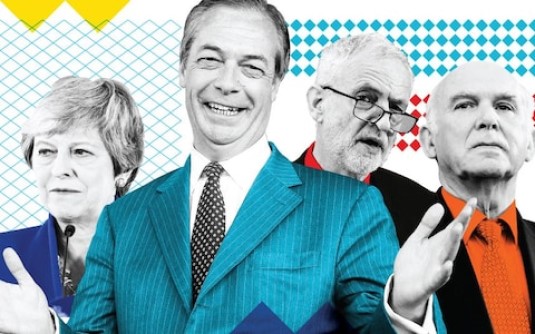Our Polarised Electorate

For the Tories, as exactly how Theresa May got the Tories in this mess in the first place.
And Labour? Oh Labour, Labour, Labour. Of course, seeing the party vote melt away in London and everywhere of significance was pretty grim. Even saying see ya to Gerard Batten, and the pathetic result for Yaxley-Lennon was scant consolation. But as night follows day, the calls have grown attacking Labour's Brexit position as confusing (it's not confusing, it just doesn't lend itself to a polarised election contest), and for it to go full on remain. We'll talk about that in another post, but it is worth noting that outside of London it was the Brexit Party who appeared to benefit most from our misfortunes, and so simply switching our position is not without consequence.
You can understand the panic all over the place, but there are two main things that have to be remembered. As with the local election results, EU elections don't matter as far as most people are concerned. This has two consequences: most stay at home (hence the turn out), and those who don't are more likely to protest. For instance, the story pushed by Lady Jess of loyal Brummie Labour activists voting LibDem on the quiet (that they didn't secretly punt for the Greens says a great deal about how awful their politics are) might be true, but would they have done so during a general election? Unlikely.
The second observation is older people are more likely to turn out in elections, and this is especially magnified when it comes to second order elections. Why is this relevant? Because, as we know, there are big differences between older and younger voters. The older you are, particularly if you are retired, the more likely you are to vote for the right for a number of reasons. This suggests the Brexit Party vote, on 31%, is inflated in the sense it could never get that were turnout increased. Therefore, for those holding out a hope for Labour doing well on a second referendum ticket, a general election is going to turn out more of, for want of a better phrase, its kind of people. And there is also this piece from the LSE making the case of interpreting the results as a swing away from Leave to Remain, suggesting there is a bigger pool for Labour to fish from than the shrinking pond available for the Tories.
The final thing worth recalling are those Westminster polls which, despite being overwritten by EU election concerns, give us different numbers to Sunday night's cluster mess. It isn't just that people care more because government has a greater impact on people's lives (and yes, even more than Brexit), but because the political economy that gave us 2017's polarised vote is still there. And that's not going away, no matter the contortions and spin put on Sunday's vote.
Comments
Post a Comment